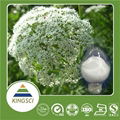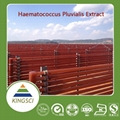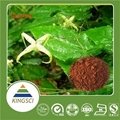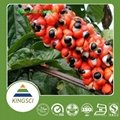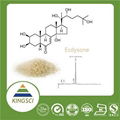| Model: | KS-15 |
|---|---|
| Brand: | KINGSCI |
| Origin: | Made In China |
| Category: | Agriculture & Foods / Agricultural Products & Resources / Plant Extract |
| Label: | White Willow Bark Ex , salicin |
| Price: |
US $11
/ kg
|
| Min. Order: | 1 kg |
| Last Online:18 Jan, 2017 |
Manufacturer supply Pure Natural White Willow Bark Extract salicin
Name: Saliciin
Specification: 98.0% Saliciin Test by HPLC
Efficacy: Inflammation-relieving
Plant original: Salix alba L.
Specifications: 98.0% Saliciin Test by HPLC
Molecular Formula: C13H18O7
Molecular Mass: 286.29
CAS No: 138-52-3
White Willow (Salix alba ), also known as weeping willow, and Salicin willow, has been renowned for its pain- and inflammation-relieving abilities for thousands of years. The bark of the white willow tree contains salicin, an analgesic compound from which salicylic acid and later acetylsalicylic acid (otherwise known as aspirin) were derived. Today, herbalists recommend white willow bark for headache, fever, arthritis, and other disorders characterized by pain and inflammation, including heart disease.
3. Indications and Uses
White willow contains the same salicylates used in aspirin, but in a less concentrated form. Although aspirin works faster,
white willow may be a better choice for those who get stomachaches from aspirin or who are treating chronic pain conditions, such as rheumatoid arthritis.
Low dose aspirin are now recommended to prevent heart attack. Aspirin thins the blood, which can help prevent blood clots that cause heart attack and stroke.
Drinking willow bark tea may have the same effect, without increasing the risk of stomach bleeding and ulcers. White willow can also suppress inflammation and uterine cramping caused by prostaglandins.Like aspirin, white willow may help reduce the risk of stomach and colon cancer. In one study it was also shown to help reduce blood sugar.
4. Safety concerns
Do not give white willow to children to treat fever resulting from cold, flu, or chickenpox.it is not known if white willow, like aspirin, could cause potentially fatal Reye syndrome in children with these illnesses.
People with ulcers or gastrointestinal conditions should not use white willow without first consulting their doctor.white willow may aggravate symptoms or cause stomach upset in some sensitive individuals.
Those taking blood thinners should avoid this herb also, as it may increase the action of these medications.
5. Dosage Information
Standardized extracts of white willow bark are available – where total salicin intake is typically 60-120mg per day for relief of acute pain, fever or inflammation. For longer-term consumption as an adjunct to weight management and thermogenesis, smaller doses are generally tolerated much better.
The Information had not been evaluated by the Food and Drug Administration, only for reference
Package:
(1)1kg/bag (1kg net weight, 1.2kg gross weight, packed in an aluminum foil bag; Outer: paper carton; Inner: double-layer PE)
(2)5kg/bag (5kg net weight, 5.2kg gross weight, packed in an aluminum foil bag; Outer: paper carton; Inner: double-layer PE)
(3)10kg/drum (10kg net weight, 12kg gross weight; Packed in a cardboard-drum with two plastic-bags inside; Drum Size: 310mm high, 400mm diameter)
(4)25kg/drum (25kg net weight, 28kg gross weight; Packed in a cardboard-drum with two plastic-bags inside; Drum Size: 510mm high, 350mm diameter)
(5)Customized package is available.
Storage:
(1)Stored in a cool and dry well-closed container and in ventilated area,
(2)kept away from moisture and strong light or high temperature.
(3)Two years under well storage situation and stored away from direct sun light.
